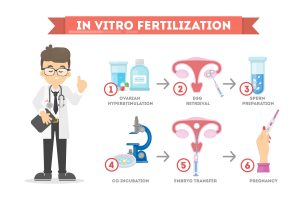In Vitro Fertilization (IVF) has become a widely known and accepted method for individuals and couples struggling with infertility to achieve their dream of parenthood. However, the journey through IVF can be a complex and often unpredictable process, raising the question: How many IVF cycles does it typically take to achieve pregnancy?
Understanding IVF (In Vitro Fertilization)
IVF procedure is a fertility treatment in which eggs are fertilized by sperm in a laboratory, and the resulting embryos are then transferred to the woman’s uterus in the hope of achieving a successful pregnancy. This process involves several steps, including ovarian stimulation, egg retrieval, fertilization, and embryo transfer.

Factors that Affect IVF Success Rates
The success of IVF can be influenced by a variety of factors, including the woman’s age, the cause of infertility, the quality of the eggs and sperm, and the overall health of the individual or couple. Additionally, factors such as the clinic’s experience, the protocols used, and the embryo transfer technique can also play a significant role in determining the outcome of an IVF cycle.
How Many IVF Cycles Does it typically Take to Achieve Pregnancy?
The number of IVF cycles required to achieve pregnancy can vary greatly from person to person. On average, it is estimated that it takes around 2-3 IVF treatment cycles to achieve a successful pregnancy. However, this number can be higher or lower depending on the individual circumstances. Some individuals may achieve pregnancy on their first cycle, while others may require several attempts before a successful outcome.
Factors that Influence the Number of IVF Cycles Needed
- Age: Younger women generally have higher success rates with IVF, with a higher chance of achieving pregnancy per cycle. As women age, the success rates decline, and more cycles may be required.
- Cause of infertility: Certain infertility factors, such as blocked fallopian tubes, endometriosis, or male infertility, may require more IVF cycles to overcome.
- Egg and sperm quality: The quality of the eggs and sperm used in the IVF process can significantly impact the success rates. Individuals with higher-quality eggs and sperm may require fewer cycles.
- Previous IVF attempts: If an individual has undergone previous unsuccessful IVF cycles, the chances of success in subsequent cycles may be lower.
- Genetic factors: Certain genetic or chromosomal abnormalities can also affect the success of IVF, potentially requiring more cycles to achieve a successful pregnancy.
The Importance of Patience and Persistence in the IVF Journey

Undergoing IVF can be an emotional and physically demanding process, and it’s essential to approach it with patience and persistence. The journey to parenthood through IVF is unique for everyone, and it’s important to understand that success rates can vary widely. Maintaining a positive mindset, seeking support, and being prepared for the possibility of multiple cycles can help individuals and couples navigate the IVF process more effectively.
Strategies to Maximize IVF Success Rates
While the number of IVF cycles required can vary, there are several strategies that individuals and couples can employ to help maximize their chances of success:
- Optimizing overall health: Maintaining a healthy lifestyle, including a balanced diet, regular exercise, and stress management, can improve the overall health and fertility of both partners.
- Selecting a reputable fertility clinic: Choosing a fertility clinic with experienced healthcare professionals and a proven track record of success can increase the chances of a successful IVF outcome.
- Exploring alternative treatments: In some cases, complementary therapies, such as acupuncture or herbal medicine, may be used in conjunction with IVF to enhance the chances of success.
- Considering genetic testing: Preimplantation genetic diagnosis or testing for aneuploidy (PGT-A) can help identify and select the healthiest embryos for transfer, potentially improving the chances of a successful pregnancy.
- Exploring embryo cryopreservation: Freezing and storing high-quality embryos for future use can provide additional opportunities for successful pregnancy, reducing the need for multiple fresh IVF cycles.
Alternative Options for Achieving Pregnancy
While IVF is a popular and widely used fertility treatment, it’s not the only option for individuals and couples seeking to achieve pregnancy. Depending on the specific circumstances, other alternatives may be considered, such as intrauterine insemination (IUI), donor eggs or sperm, or adoption.
Emotional and Financial Considerations in Multiple IVF Cycles
Undergoing multiple IVF cycles can be a journey filled with hope, resilience, and often uncertainty. The process can take a toll both emotionally and financially, making preparation and support crucial for individuals and couples navigating this path.
Emotional Considerations
Each IVF cycle comes with its own set of expectations and emotional highs and lows. The anticipation of results, dealing with disappointment, and managing the stress of repeated procedures can be overwhelming. Many individuals experience anxiety, depression, or feelings of isolation during this time. It is essential to acknowledge these emotions and prioritize mental well-being. Seeking support from mental health professionals, such as therapists or counselors specializing in fertility issues, can provide tools to cope with stress and maintain emotional balance. Joining support groups or connecting with others who have experienced similar journeys can also create a sense of community and understanding.

Financial Considerations
The financial impact of multiple IVF cycles can be significant, often adding to the stress of the process. Costs can include medical procedures, medications, travel, and time away from work. For many, this means careful budgeting, exploring financing options, or even making lifestyle adjustments to afford treatment. Consulting with financial advisors who understand fertility-related expenses can help couples make informed decisions. Additionally, researching insurance coverage, grants, or programs that assist with fertility treatments can alleviate some of the financial burden.
Holistic Preparation
Balancing emotional and financial considerations requires open communication and planning. Couples should discuss their limits—both emotionally and financially—before beginning multiple cycles. A clear plan and a strong support network help individuals manage the process more effectively and approach the journey with resilience and hope.
Support Networks for Individuals and Couples Going through IVF
The journey of in-vitro fertilization (IVF) can be both physically and emotionally demanding, often leaving individuals and couples feeling isolated. However, a wealth of support networks exists to provide guidance, comfort, and a sense of community during this challenging time.
Online Forums and Communities
Online forums and social media groups dedicated to fertility and IVF provide a safe space for sharing experiences, asking questions, and receiving encouragement from others who understand the journey firsthand. Platforms such as dedicated fertility forums, Reddit communities, or Facebook groups connect individuals across the globe, fostering a sense of solidarity and shared understanding.
Support Groups
Local and virtual support groups bring together individuals and couples facing similar challenges. These groups, often led by experienced facilitators or mental health professionals, offer a structured environment for participants to express their emotions, exchange advice, and gain insights into the IVF process. Sharing personal stories in these settings can be therapeutic and inspiring.
Counseling Services
Therapists specializing in fertility-related issues play a vital role in addressing the emotional aspects of IVF. Individual or couples therapy can help manage stress, improve communication, and build coping strategies for the uncertainties and complexities of the process. Many fertility clinics also offer in-house counseling services as part of their treatment plans.
Patient Advocacy Organizations
Organizations such as Resolve: The National Infertility Association and Fertility Network UK provide extensive resources for those undergoing IVF. These include informational webinars, financial assistance programs, and advocacy initiatives to raise awareness about fertility challenges. Such organizations often act as a bridge, connecting individuals with the resources and support they need.
Personal Support Networks
Family and close friends can provide invaluable support when they understand the emotional intricacies of IVF. Open communication about needs and boundaries can strengthen these relationships during the journey.
By leveraging these networks, individuals and couples can navigate the complexities of IVF with greater resilience, knowing they are not alone in their journey.
Conclusion
In conclusion, the number of IVF cycles required to achieve pregnancy can vary greatly from person to person, depending on a variety of factors. While the average is around 2-3 cycles, some individuals may achieve success on their first try, while others may require more attempts. The key is to approach the IVF journey with patience, persistence, and a willingness to explore various strategies and alternatives to maximize the chances of success.
If you’re considering IVF or have already started your journey, we encourage you to reach out to a fertility specialist to discuss your options and develop a personalized plan. Remember, the path to parenthood is unique for everyone, and with the right support and guidance, you can increase your chances of achieving your dream.